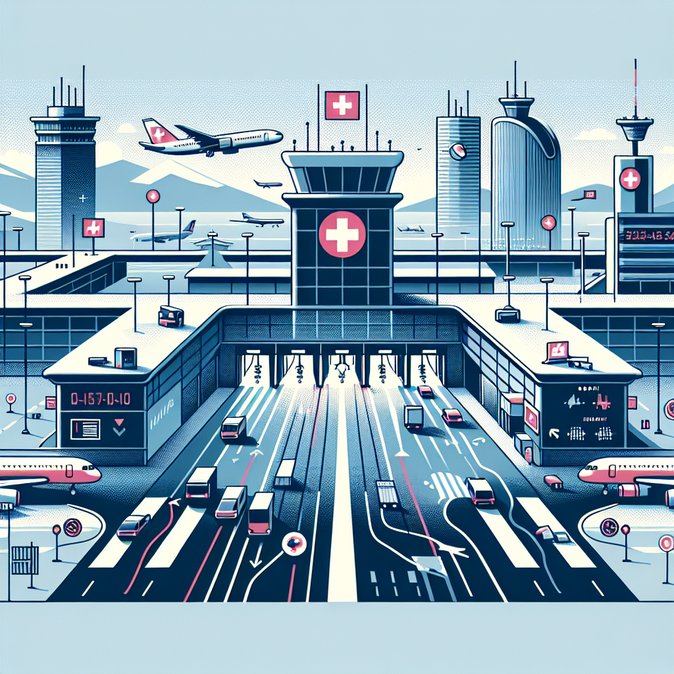
Just ten days after the European Union switched on its long-awaited Entry/Exit System (EES), Switzerland’s three intercontinental airports—Zurich, Geneva and Basel-Mulhouse—faced their first real stress-test on 22 October. Although the biometric kiosks had already been activated on 12 October, the autumn-holiday wave of business travellers and expatriate families returning from abroad produced the largest passenger volumes since the launch.
According to the State Secretariat for Migration (SEM), processing times for third-country nationals averaged six minutes at Zurich and eight minutes at Geneva during the morning peak—roughly double the pre-EES norm, but still below worst-case forecasts. The longest queues were reported at Basel-Mulhouse where French border police operate the controls; several early-morning easyJet flights departed 20-30 minutes late. Airport authorities blamed a combination of first-time enrolments, travellers unfamiliar with fingerprint scanners and a shortage of trained staff at French booths.
Swiss carriers and corporates are responding quickly. SWISS and several travel-management companies have begun pre-trip webinars explaining how to register biometrics and urging mobile workers to arrive 30 minutes earlier than before. Large pharmaceutical firms in Basel told employees to factor possible delays into same-day meeting itineraries and to carry paper proof of residence permits to avoid misunderstandings at the kiosk.
In the medium term, the government sees upsides. Once travellers are enrolled, repeat crossings should take under 60 seconds, eliminating the manual passport stamp and creating a fully digital exit record that can be reused for VAT-refund validation and automated immigration analytics. SEM confirmed that the data captured in Switzerland will be stored only on EU central servers and will be interoperable with the forthcoming ETIAS travel authorisation (planned for late 2026). For Swiss-based multinationals, the new system promises more predictable overstay monitoring and improved security vetting of contractors arriving from outside Schengen.
Nonetheless, business-travel stakeholders warn that the transition period will last months, not weeks. Airport operator Flughafen Zürich AG is accelerating installation of 40 additional kiosks, while the government has approved temporary overtime budgets for border-guard units through year-end. Travellers should expect sporadic bottlenecks—especially on Mondays and Fridays—until at least the Christmas peak.
According to the State Secretariat for Migration (SEM), processing times for third-country nationals averaged six minutes at Zurich and eight minutes at Geneva during the morning peak—roughly double the pre-EES norm, but still below worst-case forecasts. The longest queues were reported at Basel-Mulhouse where French border police operate the controls; several early-morning easyJet flights departed 20-30 minutes late. Airport authorities blamed a combination of first-time enrolments, travellers unfamiliar with fingerprint scanners and a shortage of trained staff at French booths.
Swiss carriers and corporates are responding quickly. SWISS and several travel-management companies have begun pre-trip webinars explaining how to register biometrics and urging mobile workers to arrive 30 minutes earlier than before. Large pharmaceutical firms in Basel told employees to factor possible delays into same-day meeting itineraries and to carry paper proof of residence permits to avoid misunderstandings at the kiosk.
In the medium term, the government sees upsides. Once travellers are enrolled, repeat crossings should take under 60 seconds, eliminating the manual passport stamp and creating a fully digital exit record that can be reused for VAT-refund validation and automated immigration analytics. SEM confirmed that the data captured in Switzerland will be stored only on EU central servers and will be interoperable with the forthcoming ETIAS travel authorisation (planned for late 2026). For Swiss-based multinationals, the new system promises more predictable overstay monitoring and improved security vetting of contractors arriving from outside Schengen.
Nonetheless, business-travel stakeholders warn that the transition period will last months, not weeks. Airport operator Flughafen Zürich AG is accelerating installation of 40 additional kiosks, while the government has approved temporary overtime budgets for border-guard units through year-end. Travellers should expect sporadic bottlenecks—especially on Mondays and Fridays—until at least the Christmas peak.



